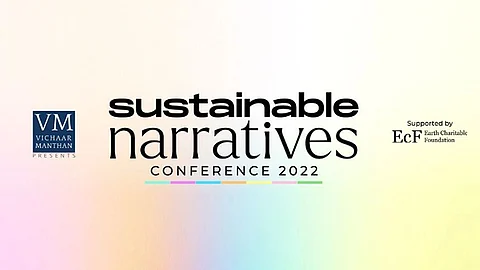

The biennial conference, Vichaar Manthan Sustainable Narratives (VMSN), once again brought together leading academic luminaries, authors, philosophers, policymakers and industry leaders to explore and address some of the world’s most significant challenges of the day.
VMSN 2022 explored myriad themes such as Democracy, Indian history, Hindutva, the position of women in religion and much more over a three-day virtual conference this month, supported by Earth Charitable Foundation.
Here, iGlobal explores some of the topics covered as part of a Vichaar Manthan Series.
MORE LIKE THIS…
What is Democracy
"The word democracy is probably the most undefined thing in the world, and lots of people use the word to define lots of different things," said Peter Emerson, Director of the De Borda Institute, in conversation with Pravar Petkar, PHD student of Edinburgh Institute.
Emerson has authored several notable books like 'Defining Democracy', 'From Majority rule to Inclusive Politics’, and many more.
During the discussion, Emerson explored topics within the realm of Democracy in context of the UK, like – 'What should the UK's Electoral system be?'
He then discussed and analysed several complex political ideas and incidents through an explicit model, which made the analysis easy to follow. Discussions on Ireland's complete autonomy or partial, the crisis of Ukraine and the UK's voting on Brexit were engaging, profound and eye-opening.
"People worked on a sort of binary logic and made a huge mistake. They decided that if you get a majority opinion in a binary vote, that opinion will be the majority's will. But in politics, in pluralist democracies, most controversies are not binary.
"If we take a recent example in the UK, well, the UK could be in the European Union, or it could be in the European Economic Area, or it could be in the Customs Union or under the WTO. We only had one majority vote, 'yes' or 'no' - to remain or leave the EU. Now, if you got a majority 'in favour', then maybe you could say, OK, that's what people want. But when you get a majority 'against', you still don't know what people actually do want," he said.
MORE LIKE THIS…
Understanding Hindutva
On Day 2 of the conference, there was a fireside conversation on the topic of 'Understanding Hindutva'.
Vichaar Manthan explains the context for this conversation as: "Hindutva simply means 'Hindu-ness'; it is about being Hindu, nothing more!" Western narratives about Hindutva deny this and are far more cynical. On the whole, Western commentators and their Indian counterparts see Hindutva as an assertive nationalist force that will create divisive majoritarianism in India.
“With the rise of the Bharatiya Janata Party, its position at the heart of government and its overwhelming electoral mandate, interest grows in deciphering Hindutva with greater nuance."
Senior Adjunct Professor of South Asia Studies, Johns Hopkins University, Walter Andersen, spoke at length and with great clarity, detailing the implications of 'Hindutva' for Indians and the rest of the world.
Anderson has authored two books – 'The Brotherhood In Saffron: The Rashtriya Swayamsevak Sangh And Hindu Revivalism' and 'The RSS: A View to the Inside'.
MORE LIKE THIS…
So, what is Hindutva? Anderson talks about Hindutva as a political, civilisational and religious idea, referring to Vinayak Damodar Savarkar's book on the subject, which has influenced Indian youths, particularly cities like Nagpur, and formed the foundation of the Indian organisation Rashtriya Swayamsevak Sangh (RSS).
He drew a clear distinction between the ideas of Hinduism as a religion and the notion of Hindutva that Savarkar defined in his book, which rejects several measures like the caste system and untouchability. He explained that Hindutva and India as a modern nation primarily focussing on this idea today has much to do with a certain culture and identity toward one's 'fatherland'.
*More info: Vichaar Manthan